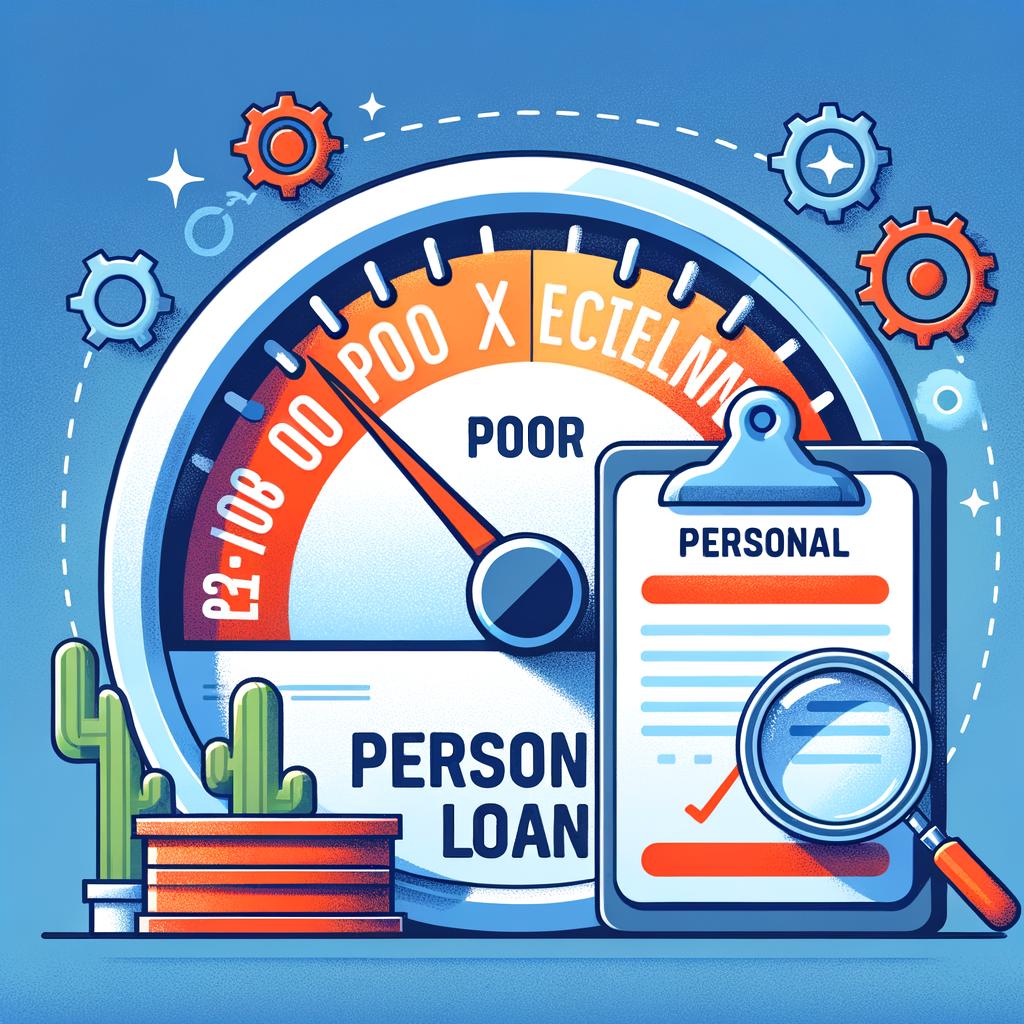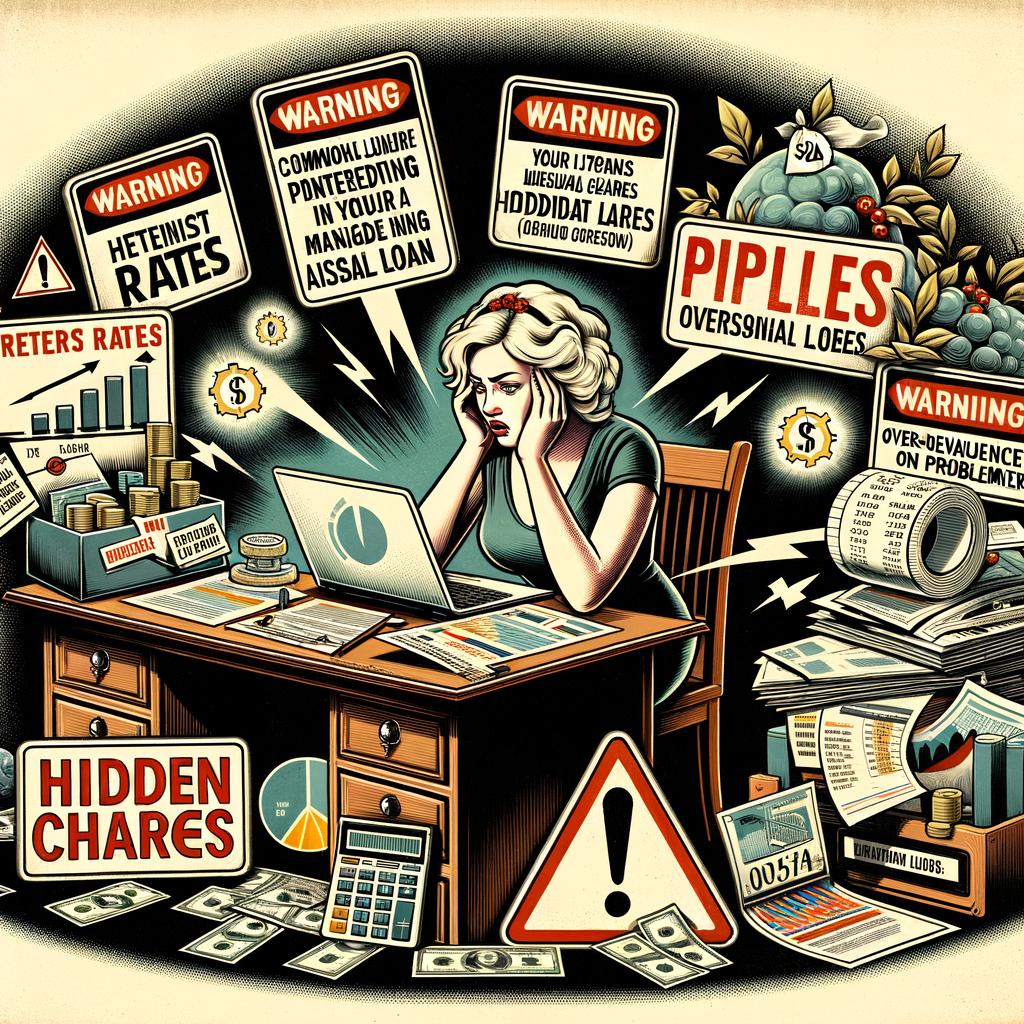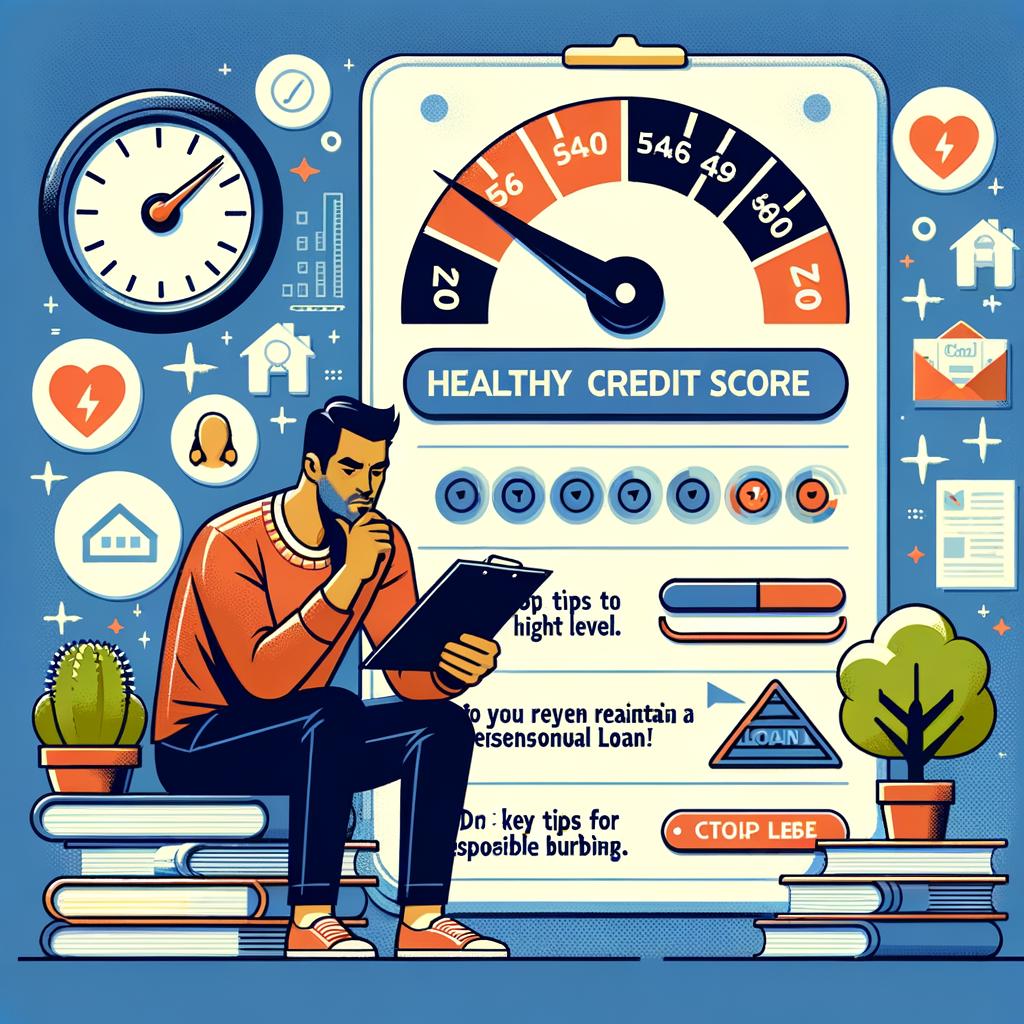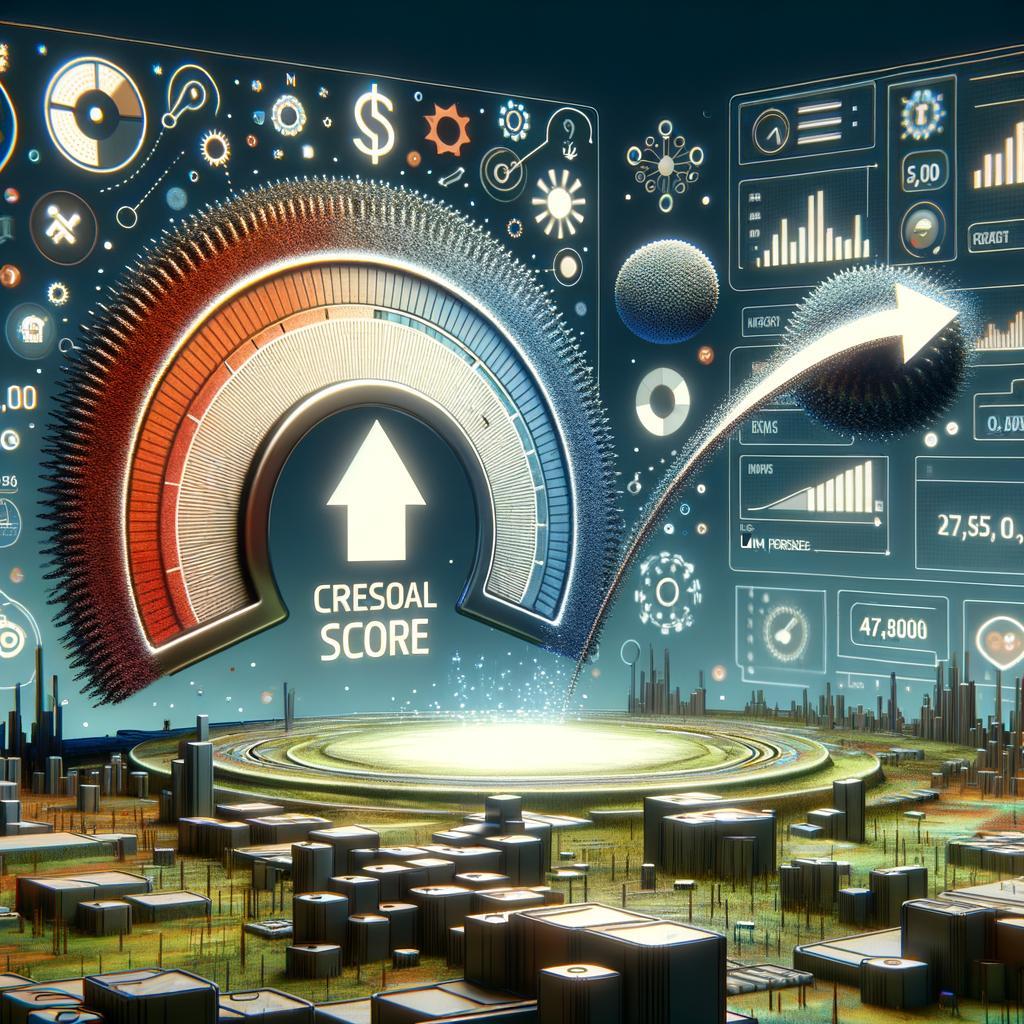In the grand tapestry of personal finance, few threads are as pivotal and enigmatic as your credit score. It’s a three-digit number that wields the power to open doors to new opportunities or to close them with a resounding thud. Among the myriad ways that this number is influenced, taking out a personal loan stands as one of the most significant, yet often misunderstood, actions. Whether you’re contemplating a personal loan to consolidate debt, finance a major purchase, or cover unexpected expenses, understanding its impact on your credit score is crucial. Join us as we delve into the intricate dance between personal loans and credit scores, unraveling the nuanced effects that this financial decision can have on your fiscal standing. Grab a cup of coffee, settle into your favorite chair, and let’s navigate the labyrinth of credit scores together.
Table of Contents
- Understanding the Impact of Personal Loans on Your Credit Score
- Factors That Can Positively Influence Your Credit Rating with a Personal Loan
- Potential Pitfalls to Watch for When Managing a Personal Loan
- Expert Tips for Maintaining a Healthy Credit Score with a Personal Loan
- Q&A
- In Summary

Understanding the Impact of Personal Loans on Your Credit Score
Personal loans can play a significant role in shaping your credit score. While they offer a helpful financial resource, their impact on your creditworthiness can vary, depending on multiple factors. Understanding these elements is key to making informed financial decisions.
Credit Mix Diversification is one benefit of personal loans. Lenders look favorably on a diversified credit portfolio, which can include revolving credit (like credit cards) and installment credit (such as personal loans). Adding a personal loan to your credit mix may positively affect your credit score by demonstrating your ability to manage different types of credit.
Another factor to consider is the credit inquiry. When you apply for a personal loan, the lender will perform a hard inquiry on your credit report. Although this might cause a slight, temporary dip in your credit score, it’s often minimal. Multiple inquiries in a short period can be more detrimental, though, so consolidating loan applications within a short timeframe is advisable.
Timely repayments are crucial. Payment History, which accounts for a significant portion of your credit score, can benefit greatly if you make loan payments consistently and on time. Late or missed payments, conversely, can have a profoundly negative impact. Setting up automated payments or reminders can help maintain a positive payment history.
| Positive Impact | Negative Impact |
|---|---|
| Diversifies credit mix | Possible initial dip from hard inquiry |
| Builds positive payment history | Late/missed payments damage credit score |
| Can increase the total available credit | Increased debt load |
Your overall debt-to-income ratio also matters. Taking on a new personal loan increases your total debt obligation, which can affect your credit score adversely if the debt becomes unmanageable. It’s important to evaluate how the additional loan fits into your overall financial landscape.
Another key point is credit utilization rate. Personal loans do not contribute directly to credit card utilization ratios but can influence your ability to stay financially balanced. If you use a personal loan to pay off high-interest credit card debt, you could lower your credit utilization ratio, benefiting your credit score in the process.
Loan duration can also influence your credit score. A longer loan term with smaller monthly payments can be easier to manage and more beneficial for your payment history. However, it might lead to higher overall interest payments, which is a trade-off worth considering.
- Quick Tip: Avoid applying for multiple loans simultaneously to prevent unnecessary hard inquiries.
- Actionable Advice: Always assess your capacity to repay before taking out a personal loan.
a personal loan can have both positive and negative effects on your credit score, largely based on how you manage the loan. By understanding the factors involved, you can leverage personal loans to not only meet financial needs but also potentially enhance your credit standing over time.

Factors That Can Positively Influence Your Credit Rating with a Personal Loan
Securing a personal loan can be more than just a means to cover expenses or consolidate debt. When managed responsibly, it can also bolster your credit rating. Here are some ways this financial tool might work in your favor:
Timely Payments
Making regular, on-time payments is a cornerstone of building and maintaining a healthy credit score. Personal loans, structured with fixed monthly payments, provide a predictable schedule. Consistently meeting these deadlines demonstrates reliability to credit bureaus, positively impacting your score.
Credit Mix
Credit scoring models, such as FICO, favor individuals who can manage various types of credit responsibly. Adding a personal loan to your credit profile gives you a mix of revolving credit (like credit cards) and installment credit (your loan). This diverse portfolio can enhance your perceived creditworthiness.
- Installment credit: Personal Loans, Auto Loans, Mortgages
- Revolving credit: Credit Cards, Lines of Credit
Lowering Credit Utilization Ratio
Your credit utilization ratio is the amount of revolving credit you’re using compared to your total available credit. If you use a personal loan to pay off credit card debt, you might see an immediate reduction in your utilization rate. Lower utilization is a key factor in improving your credit score.
Demonstrating Creditworthiness
Successfully managing a personal loan shows lenders that you are capable of handling debt responsibly. Over time, this can lead to more favorable terms on future loans, including lower interest rates and higher credit limits.
Creating Positive Payment History
Every timely payment on your personal loan is recorded in your credit history, contributing to your payment record. Consistent, punctual payments can slowly but surely paint a positive picture, significantly boosting your score over time.
Avoiding Multiple Hard Inquiries
While applying for loans results in hard inquiries, too many in a short period can hurt your score. Aim to keep such applications within a focused time frame—usually within 14-45 days—so they combine and count as a single inquiry.
| Factor | Positive Impact |
|---|---|
| Timely Payments | Improves payment history |
| Credit Mix | Enhances credit diversity |
| Credit Utilization | Lowers utilization ratio |
| Positive Payment History | Boosts creditworthiness |
Debt Reduction Plan
A well-managed personal loan can be part of a broader strategy to tackle existing debts. Whether consolidating high-interest credit card balances or financing significant purchases sparingly, becoming debt-free ultimately benefits your credit score.

Potential Pitfalls to Watch for When Managing a Personal Loan
When handling a personal loan, it’s important to tread carefully. While taking out a loan might seem straightforward, managing it improperly can lead to unforeseen consequences, particularly affecting your credit score. Here are several potential pitfalls to watch out for:
- Late or Missed Payments: One of the most significant issues is missing due dates. Lenders report late payments to credit bureaus, which can negatively impact your credit score.
- High Interest Rates: Personal loans often come with high interest rates, especially if your credit score is less than perfect. This can make the loan more expensive in the long run and harder to pay off.
- Over-borrowing: Requesting a higher loan amount than needed can seem like a convenient cushion, but it also means more debt to manage. This can strain your finances and lower your credit score if not handled well.
Another area of concern is the potential for loan scams. Fraudulent lenders might promise low-interest rates and quick approvals, but they could be setting you up for identity theft or extravagant fees. Always verify the legitimacy of a lender before sharing your personal information.
Poorly managing multiple loans can also be troublesome. If you have several loans, keeping up with different payment schedules can be confusing. Missing payments on one loan while juggling others can snowball into significant damage to your credit score.
It’s essential to be wary of debt consolidation pitfalls as well. While consolidating multiple loans into a single payment can simplify management, it sometimes leads to extending the repayment period, meaning you will pay more interest over time. Mismanagement of the consolidation plan can also lead to new financial difficulties.
Prepayment penalties are another aspect to consider. While it might sound advantageous to pay off your loan early, some lenders impose penalties for this. These extra fees can undercut the benefits of closing your debt ahead of schedule.
Be sure to examine the loan’s terms and conditions thoroughly. Hidden fees, such as origination fees, processing fees, and service charges, can unexpectedly increase your loan’s total cost. Lack of awareness about these fees can lead to budgeting errors and financial strain.
| Potential Pitfall | Impact on Credit Score |
|---|---|
| Late Payment | Negative Impact |
| High Interest Rates | Indirect Negative Impact |
| Over-borrowing | Negative Impact |
| Loan Scams | Severe Negative Impact |
Lastly, be cautious of how your debt-to-income ratio might be affected by the loan. This ratio is a critical factor in determining your creditworthiness when you apply for additional credit. A high debt-to-income ratio can lower your credit score, making it harder to secure favorable terms for future loans.

Expert Tips for Maintaining a Healthy Credit Score with a Personal Loan
When you take out a personal loan, it’s important to stay vigilant about its impact on your credit score. Start by understanding the type of personal loan you’re committing to, whether it’s secured or unsecured. This fundamental difference can influence your score in distinct ways. For instance, secured loans, backed by collateral, might be less risky but can still affect your credit if payments are mishandled.
Timely payments are crucial. One of the most important factors in maintaining a healthy credit score with a personal loan is ensuring that you make all your payments on time. Late or missed payments can have a significant negative impact on your score. Set up automatic payments or reminders to ensure you never miss a due date.
- Automate your payments: This reduces the risk of forgetting a due date.
- Set calendar reminders: Mark your payment dates to stay on track.
Manage your credit utilization wisely. While personal loans do not directly factor into your credit card utilization rate, they represent a portion of your overall debt. Keep an eye on how much credit you’re using relative to your total credit limit across all accounts, including the personal loan.
| Factor | Impact on Credit Score |
|---|---|
| Payment History | 35% |
| Credit Utilization | 30% |
| Length of Credit History | 15% |
| Types of Credit | 10% |
| New Credit | 10% |
While you shouldn’t avoid adding new accounts altogether, limit the number of hard inquiries on your credit report. Each time you apply for a personal loan, a lender performs a hard inquiry, which can temporarily lower your credit score. Be strategic and only apply for loans when absolutely necessary.
Balance your credit mix by retaining a variety of credit types. A well-rounded credit portfolio, which includes installment loans like personal loans, credit cards, and possibly even a mortgage, demonstrates responsible credit behavior. However, this doesn’t mean you should open new accounts indiscriminately — quality over quantity.
Regularly monitor your credit report to ensure there are no errors or unexpected changes. Discrepancies can negatively affect your score, so staying on top of this allows you to correct any issues promptly. Most credit bureaus offer free annual reports, which can be an invaluable resource.
Keep your debt-to-income (DTI) ratio in check. Lenders assess this ratio to determine your ability to manage monthly payments and repay debts. A lower DTI ratio signifies better financial health and can positively impact your credit score over time.
be cautious with debt consolidation strategies. While consolidating multiple debts with a personal loan might lower your monthly payments and reduce overall interest rates, making the right choices about term length and repayment plans is key. A well-planned approach helps improve your credit score, but poor decisions could have the opposite effect.
Q&A
Q&A: How Does A Personal Loan Affect Your Credit Score?
Q1: What is a personal loan?
A personal loan is a type of unsecured loan that you can use for various financial needs, such as consolidating debt, covering medical expenses, or financing a large purchase. Unlike secured loans that require collateral, personal loans are typically granted based on your creditworthiness and ability to repay.
Q2: How does taking out a personal loan impact my credit score initially?
When you apply for a personal loan, the lender will perform a hard inquiry on your credit report to assess your credit risk. This hard inquiry can temporarily lower your credit score by a few points. However, this dip is usually short-lived if you continue to meet your other financial obligations.
Q3: Can a personal loan improve my credit score over time?
Yes, a personal loan can improve your credit score over time if managed responsibly. Making on-time payments consistently demonstrates your reliability and improves your payment history, which is a crucial factor in calculating your credit score. Diversifying your credit mix by adding a personal loan can also have a positive impact.
Q4: What are the potential downsides of a personal loan on my credit score?
Potential downsides include the risk of missed or late payments, which can significantly harm your credit score. Additionally, taking on too much debt can negatively affect your credit utilization ratio, and opening too many new credit accounts in a short period can be viewed unfavorably by lenders.
Q5: How does consolidating debt with a personal loan affect my credit score?
Consolidating higher-interest debt with a personal loan might positively impact your credit score if it leads to timely payments and a lower overall credit utilization ratio. By moving your debt into a single, manageable payment, you might find it easier to keep up with payments, thus boosting your score.
Q6: Could paying off a personal loan early affect my credit score?
Paying off a personal loan early can have mixed effects. While it shows responsibility and can save you interest payments, it could also shorten your credit history length and, thus, slightly lower your score. However, the positive impact of being debt-free and having a spotless payment history usually outweighs this minor downside.
Q7: What should you consider before applying for a personal loan if you are concerned about your credit score?
Before applying, assess your current credit standing, evaluate the loan terms, and consider how the monthly payments will fit into your budget. It’s essential to borrow only what you need and ensure you’re in a position to make regular payments without strain.
Q8: Any final tips for managing a personal loan to benefit a credit score?
Stick to a repayment plan and set up automatic payments to avoid missed deadlines. Monitor your credit report regularly to ensure accuracy and address any discrepancies promptly. Managing your personal loan wisely can become a stepping stone to a healthier financial future and a stronger credit score.
Q9: Does the type of lender affect how a personal loan impacts your credit score?
Yes, different lenders may report to different credit bureaus, which can affect how your loan appears on your credit report. Research lenders and choose those that report to major credit bureaus to ensure your responsible borrowing reflects positively across your credit profiles.
Remember, a personal loan is a financial tool that, when used wisely, can aid in building a beneficial credit history. Respect its power, and it will serve you well on your journey to financial stability.
In Summary
As we navigate the labyrinth of personal finances, understanding the ripple effects of a personal loan on your credit score can be both enlightening and empowering. The journey may be dotted with numbers and percentages, yet its essence lies in the empowerment of informed decision-making. Whether you’re taking your first steps or recalibrating your financial path, remember: each choice shapes the mosaic of your credit history. Embrace the wisdom of meticulous planning, and let your credit score reflect a narrative of resilience and growth. In the dance between loan and score, may you find balance, confidence, and a future luminous with possibility.
